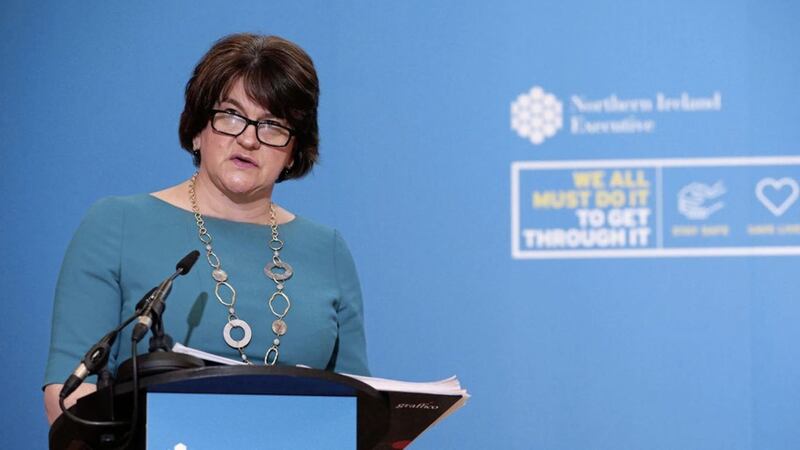First Minister Arlene Foster says there are early indications that Covid-19 restrictions are slowing the spread of the virus.
Ms Foster said Stormont's medical and scientific advisers were "optimistic" that case numbers will soon begin to fall.
"There are early indications our shared efforts are turning the tide," she said.
At a Stormont press conference this afternoon, Ms Foster said society had to learn to "co-exist" with the virus.
She stressed the need to increase the capacity of hospitals, calling in support from Britain if necessary, including from the military.
The first minister said the test, trace and protect system needed to be "scaled up" and she raised the potential for weekly testing for key workers.
She also confirmed that Executive ministers had agreed to extend free school meal support to eligible families for the additional week of school closure introduced as part of the current circuit-break.
Ms Foster said free school meal support would also be paid to families over the Halloween mid-term week.
During the press conference, economy minister Diane Dodds announced a series of new support packages for businesses.
One will see grants of £600 a week paid to businesses forced to close that were ineligible to apply for an initial scheme because they did not operate from a rateable property. That would include people such as driving instructors and hairdressers and beauticians who run mobile businesses.
Another scheme will support businesses that are not forced to close but which are in the supply chain of those that are. Those businesses will be eligible for payments ranging between £400 to £800 a week, based on their rateable value. Supply chain businesses that are not rateable can apply for a £300-a-week grant.
Ms Dodds also said support would be offered to the newly self-employed who do not qualify for the UK Government's wider self-employment scheme.
The minister said support for the tourism sector would be extended to take in businesses such as traditional pubs.
Junior minister Declan Kearney said the Executive had also agreed to take forward a programme to tackle "food poverty and holiday hunger" in the longer term.
Mr Kearney said the success of the four weeks of intensified restrictions would depend on the creation of a "permanent culture of compliance and partnership".
The junior minister also welcomed the Chancellor's changes to the new wage support scheme. Read more about the scheme
Mr Kearney said the circuit-break was designed to "buy time and create space".
He acknowledged concerns of members of the public that the four-week intervention would be followed by another period of tough restrictions.
"Let me be very clear, that is not the Executive's strategy," he said.
"We are determined to use this space to double down on developing an integrated strategy to normalise life and maximise public safety in the coming months."
.@Economy_NI Minister announces Covid Restrictions Business Support Scheme pic.twitter.com/9YFIpv65vl
— Economy NI (@Economy_NI) October 22, 2020








